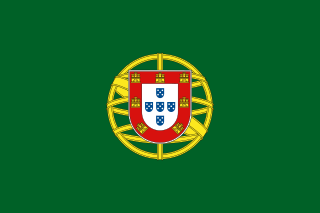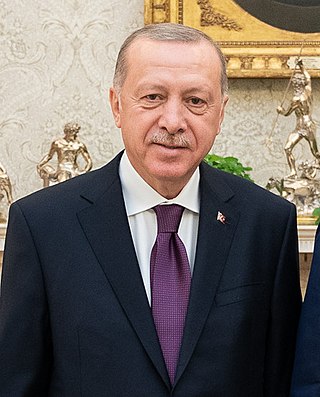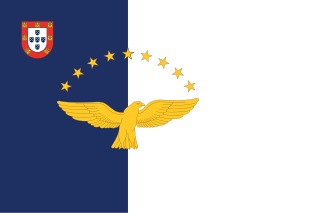
Politics in Portugal operates as a unitary multi-party semi-presidential representative democratic republic, whereby the Prime Minister of Portugal is the head of government, and the President of Portugal is the non-executive head of state with several significant political powers they exercise often. Executive power is exercised by the Government, whose leader is the Prime Minister. Legislative power is primarily vested in the Assembly of the Republic, although the government is also able to legislate on certain matters. The Judiciary of Portugal is independent of the executive and the legislature. The President exerts a sort of "moderating power", not easily classified into any of the traditional three branches of government.

The municipality is the second-level administrative subdivision of Portugal, as defined by the 1976 Constitution.

Portugal is a unitary state with delegated authority to three levels of local government that cover the entire country:

The president of the Socialist Republic of Vietnam is the head of state of Vietnam, elected by the Vietnam National Assembly from delegates of the National Assembly. Since Vietnam is a single-party state, the president is generally considered to hold the second highest position in the political system, formally after the general secretary of the Communist Party of Vietnam. In addition, the president appoints the head of government, the prime minister. As head of state, the President represents Vietnam both domestically and internationally, and maintains the regular and coordinated operation and stability of the national government and safeguards the independence and territorial integrity of the country.

The president of Portugal, officially the president of the Portuguese Republic, is the head of state and highest office of Portugal.

The Assembly of the Republic, commonly referred to as simply Parliament, is the unicameral parliament of Portugal. According to the Constitution of Portugal, the parliament "is the representative assembly of all Portuguese citizens". The constitution names the assembly as one of the country's organs of supreme authority.

Elections in Portugal are free, fair, and regularly held, in accordance with election law.

The Council of State is a body established by the Portuguese Constitution to advise the President of the Republic in the exercise of many of his or her discretionary powers.
The Hong Kong order of precedence is a nominal and symbolic hierarchy of important positions within the Government of Hong Kong. Administered by the government's Protocol Division, the hierarchy does not determine the order of succession for the office of Chief Executive, which is instead specified by the Basic Law of Hong Kong.
The Italian order of precedence is fixed by Decree of the President of the Council of Ministers (D.P.C.M.) of April 14, 2006 and of April 16, 2008. It is a hierarchy of officials in the Italian Republic used to direct protocol. The President, being head of state, is first, and the Prime Minister, the head of government, is fourth.
- The President of the Republic
- (Cardinals and princes of reigning dynasties - these officers cannot preside over the ceremony)
- The President of the Senate of the Republic
- The President of the Chamber of Deputies
- The President of the Council of Ministers (Prime-Minister)
- The President of the Constitutional Court
- Former President of the Republic
- Vice Presidents of the Senate of the Republic
- Maurizio Gasparri
- Anna Rossomando
- Gian Marco Centinaio
- Maria Domenica Castellone
- Vice Presidents of the Chamber of Deputies
- Sergio Costa
- Fabio Rampelli
- Giorgio Mulé
- Anna Ascani
- Vice Presidents of the Council of Ministers
- Antonio Tajani
- Matteo Salvini
- Vice Presidents of the Constitutional Court
- Daria de Pretis
- Nicolò Zanon
- Ministers of the Republic
- Judges of the Constitutional Court
- Presidents of Regions
- The First President of the Supreme Court of Cassation
- The President of the National Council for Economics and Labour
- Deputy Ministers of the Republic
- Quaestors of the Senate and Chamber of Deputies, in order of seniority
- Presidents of Parliamentary Commissions
- The President of the Council of State
- The President of the Court of Accounts
- The Governor of the Central Bank of Italy
- The General Prosecutor of the Supreme Court of Cassation
- The Attorney General of the Republic
- The Chief of the Defence Staff
- Senators and Deputies, in order of appointment
- The President of the Accademia dei Lincei
- The President of the National Research Council
- The President of the Superior Court of Public Waters
- The Vice President of the Council of Military Courts
- The Vice President of the High Council of the Judiciary
- The Presidents of the Autonomous Provinces of Trentino and South Tyrol
- The Deputy President of the Supreme Court of Cassation
- Prefects, in their provinces
- Mayors, in their cities
- Presidents and General Prosecutors of the Court of Appeals
- Presidents of Provinces, in their cities
- Catholic Bishops, in their dioceses
- The Chief of the Army Staff
- The Chief of the Navy Staff
- The Chief of the Air Staff
- The President of the Permanent conference of Rectors
- Ambassadors, in order of establishment of diplomatic relations with their countries
The Jamaican order of precedence is as follows:
- Charles III, King of Jamaica
- Governor-General of Jamaica
- Prime Minister of Jamaica
- Deputy Prime Minister
- Leader of the Opposition

The two Autonomous Regions of Portugal from 1999 are the Azores and Madeira. Together with Continental Portugal, they form the Portuguese Republic.
The Spanish order of precedence is currently prescribed by Royal Decree 2099/1983. The decree establishes the order of precedence of national official activities as well as common regulations to activities organised by municipalities, autonomous communities and other public institutions. The general order established by the decree is modified if the event takes place in the capital, Madrid, instead of elsewhere in Spain.
The Danish order of precedence is a symbolic hierarchy of Danish officials used to direct protocol. It has no official status and entails no special privileges, but has been established in practical use, e.g. determining seating arrangements at formal occasions in the royal house. The order of precedence is very elaborate, and especially the lower classes include many relatively obscure civil servant positions; the following is only an excerpt.

The Turkish order of precedence, the following is the list of Turkish order of precedence approved by the President of Turkey and administered by the Directorate of Protocols of the Ministry of Foreign Affairs.
The order of precedence in Argentina is a symbolic hierarchy of officials used to direct protocol. It is regulated by Presidential Decree 2072 of 10 October 1993, signed by then President Carlos Menem, and former ministers Guido di Tella and Carlos Ruckauf.
The Quebec order of precedence is a nominal and symbolic hierarchy of important positions within the province of Quebec. It has no legal standing but is used to dictate ceremonial protocol at events of a provincial nature.
- The King of Canada
- The Lieutenant Governor
- The Premier
- The Cardinals followed, when not a cardinal, by the Roman Catholic Archbishop having the status of Primate
- The President of the National Assembly
- The Chief Justice of the Court of Appeal
- The Vice-Premier
- The Dean of the Diplomatic Corps and the heads of diplomatic missions
- The Leader of the Opposition
- The members of the Executive Council
- The local Archbishop or Bishop followed by the representatives of other faith communities
- The local Mayor
- The Dean of the Consular Corps in Quebec City followed by the Dean of the Consular Corps in Montréal, the heads of post of the Consular Corps living in the capital, for events happening there, and other heads of post, governed by their respective precedence
- The vice-presidents of the National Assembly
- The chief justices of the Superior Court
- The local member of the National Assembly followed by other members
- The Secretary General of the Executive Council
- The President of the Council of the National Order of Quebec
- The chief justices of the Court of Quebec
- The rectors/principals of the local universities
- The judges of the Court of Appeal
- The Principal Secretary to the Premier followed by the deputy ministers
- The judges of the Superior Court
- The Ombudsman, the Chief Electoral Officer, the Auditor General, the presidents of the Government Agencies and Crown Corporations and the Chief of Protocol
- The judges of the Court of Quebec
- The members of the National Order of Quebec

The political status of the Azores is defined by the Political-Administrative Statute of the Autonomous Region of the Azores, which acts as the standard legal constitutional framework for the autonomy of the Portuguese archipelago of the Azores. It defines the scope of the autonomous regional government and the structure and functioning of the region's organs of government within the framework of the 1976 Constitution of Portugal. The autonomous region of Madeira has a similar status.
The following is the Barbadian Table of Precedence.
- The President of Barbados
- The Prime Minister
- The Chief Justice
- The Members of the Cabinet
- The Attorney-General of Barbados, as the first minister to be sworn in after the Prime Minister.
- Other cabinet ministers, their own order unknown.
- The former Governors-General
- The National Heroes
- The President of the Senate
- The Speaker of the House of Assembly
- The Leader of the Opposition
- The former Prime Ministers, and the former Chief Justices
- The Members of the President's Privy Council of Barbados
- The Chairman of the Barbados Christian Council
- The Ambassadors and High Commissioners
- The Justices of the Court of Appeals, and the Judges of the High Court
- The Parliamentary Secretaries
- The Deputy President of the Senate
- The Deputy Speaker of the House of Assembly
- The Members of the Senate
- The Members of the House of Assembly
- The spouses of deceased dignitaries such as: Governors-General, Prime Ministers, and National Heroes
- The Chairmen of the Commissions established under the Constitution
- The Head of the Civil Service
- The Ombudsman, Director of Public Prosecutions, and Auditor General
- The Director of Finance and Economic Affairs, the Solicitor General, the Chief Parliamentary Counsel, the Permanent Secretaries, and the Governor of the Central Bank
- The Ambassadors/High Commission (Overseas)
- The Chief of Staff for the Barbados Defence Force, and the Commissioner of Police
- 1. The Chancellor, University of the West Indies; 2. The Chairman;The Cave Hill Campus Council, University of the West Indies; 3. The Principal, Cave Hill Campus; and the Pro Vice Chancellor of the University of the West Indies.
- The former Ministers
- The Members of The Order of the Caribbean Community, and the holders of knighthoods conferred under the monarchy of Barbados.
- The holders of the Companion of Honour of Barbados
- The holders of the Companions of the Order of St. Michael and St. George
- The Heads of the regional bodies with diplomatic status.
- The Related grades, and the Clerk of Parliament
- The Chargé d'affaires and Acting High Commissioners, Deputy High Commissioners, Counsellors in Embassies, High Commissions and Legations, Consul-General - Chefs de Poste
- The Consuls - Chefs de Posts
- The Members of the Commissions established under the Constitution
- The Chairmen of Statutory Boards
- The Heads of Government Departments, including the Chief Technical Officers of departments integrated in Ministries, The Chief Magistrate, and the Chief Executive Officers of Statutory Boards
- Honorary Consuls, Vice-Consuls in Embassies, and High Commissions and Legations
The Republic of Korea has no officially recognized South Korean order of precedence, yet the Office of the President(EOP) once officially declared order of precedence among the chiefs of 6 highest constitutional institutions in year 2006 as following:
- the President of the Republic of Korea, as both head of state and leader of government
- the Speaker of the National Assembly, as leader of legislature
- the Chief Justice of the Supreme Court and the President of the Constitutional Court, as co-leader of the judiciary
- the Prime Minister, as deputy leader of government
- the Chair of the National Election Committee, as leader of constitutionally independent agency for national election administration








